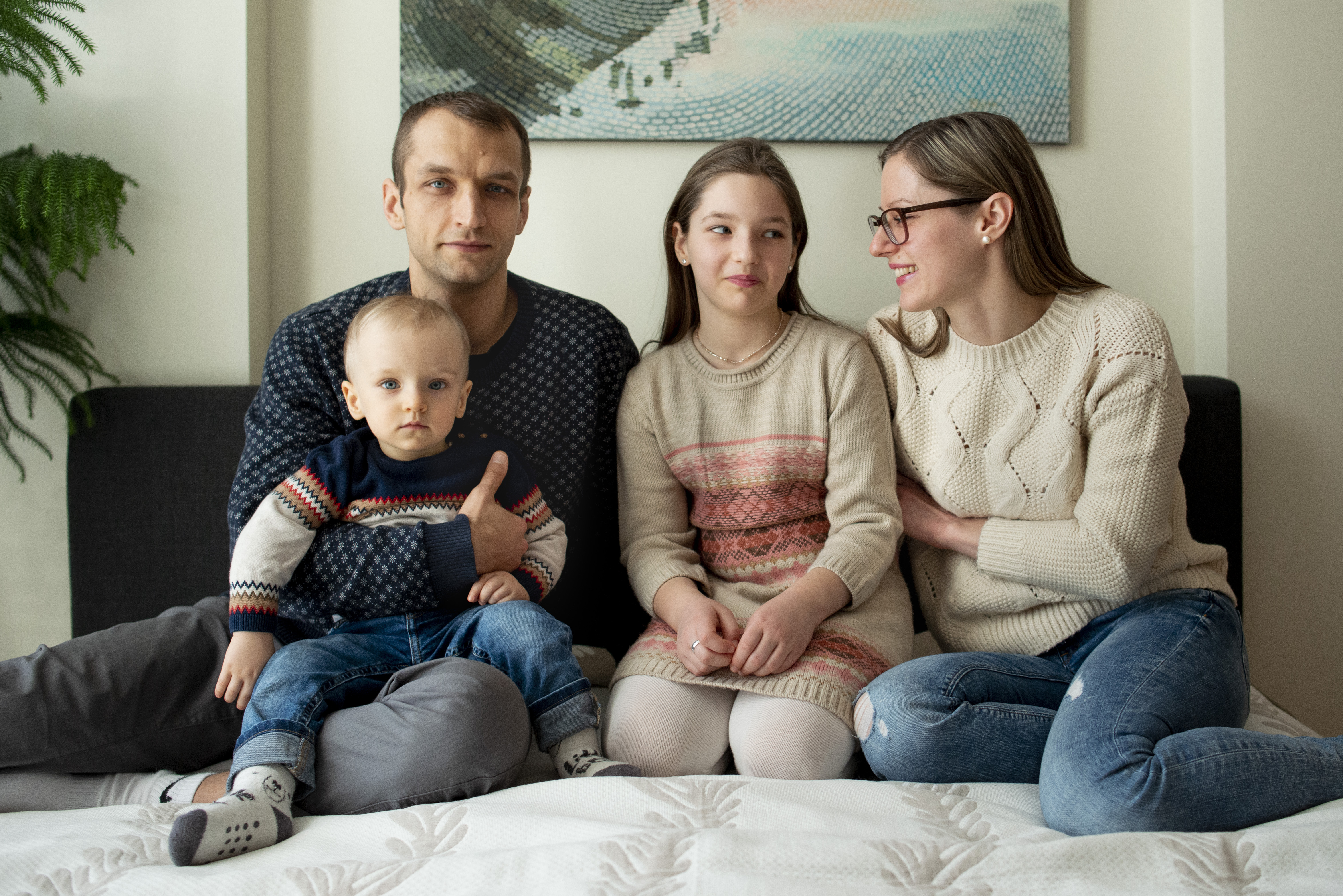 Eglė Sakalauskaitė-Juodeikienė and Žygimantas Juodeikis' family. Photo: MF
Eglė Sakalauskaitė-Juodeikienė and Žygimantas Juodeikis' family. Photo: MF
The task of introducing the present interviewees is almost impossible, because any attempts to name and define them would seem too banal and superficial. Once you read this interview, you will understand why.
Today we are talking with two doctors – neurologist Eglė Sakalauskaitė-Juodeikienė and surgeon Žygimantas Juodeikis. Having met just before their final medical exams, the couple have been together for a decade and have two children – a daughter Aušrinė and a son Radvilas.
One female medical doctor joked that she was deliberately looking for a husband who did not work in the medical field, because she was afraid they would have nothing to talk about at the dinner table. Do you think it is an advantage or a disadvantage for a couple to work in the same field?
Žygimantas: I think it is much easier for a family where both spouses are doctors – the partner understands where and why the other spouse does night shifts, there is less anxiety. They also understand that after a night shift, their partner is tired and needs to sleep. Eglė and I understand these situations. It is also important that we talk the same language – yes, Lithuanian! The same emotional Lithuanian language (laughing).
Eglė: In fact, we are not an extroverted family, both of us are fairly quiet people. We don’t host parties in our house till the early hours of the morning and the neighbours don’t call the police (laughing). Sometimes when we are very tired, it’s enough to simply sit beside each other drinking our tea in silence. It seems that we understand each other without words in those moments. Our evenings together – talking or being silent – sometimes bring real, precious moments. We share some thoughts from the books we’ve been reading or watch a film which we’ve enjoyed before.
And patients... yes, patients. Stories of their miraculous recoveries, unusual, atypical clinical symptoms, various funny moments, and sometimes just unexpected, macabre situations. Also, successful complicated surgeries or the death of a sick incurable patient, which always brings heartache. So, we talk and try to look at different situations from each other’s perspective. We agree with each other, encourage and often criticize each other.
Most important, we find support in these moments – despite all the problems in the healthcare system, despite the enormous workload, despite trying to make ends meet, despite the constant humiliation of the doctor’s profession in the media, the absolute collapse of the prestige of our profession, manifestation of mobbing among colleagues, etc. – by remaining humane, remaining those who really care about the other. As long as we can still have the feeling inside that we care about the other – those suffering, those seeking help – we will be good doctors. I don’t know if anyone from a different profession would understand the depth of it. Likewise, I don’t know if I would be able to experience the internal drama of a teacher, a lawyer or... a florist for that matter.
 E. Sakalauskaitė-Juodeikienė with daughter Aušrinė and son Radvilas. Photo: MF
E. Sakalauskaitė-Juodeikienė with daughter Aušrinė and son Radvilas. Photo: MF
Medical studies are often associated with a lack of time, constant running to keep up and sleepless nights. How accurate is this stereotype? Do those following full-time medical studies, a residency or doctoral studies “no longer have any life”?
Žygimantas: I wouldn’t agree. You can always find time for important things, everything depends on your wish, motivation to study and sensible time planning. During my medical studies, I read a lot of non-medical literature (from the Bible and the Koran to Marquez, Remarque, Borges, Schopenhauer and Nietzsche), I learned to play the piano, took part in chess tournaments, and found time to play sports. I did not devote all my time to learning Anatomy and Latin by heart, but I still managed to get many state scholarships.
Eglė: I remember I slept perfectly well during my studies. Medical studies, residency and doctoral studies, were some of the most beautiful adventures of my life! The main thing is to plan your time and not to leave all the work to the end of the semester. It’s also important not to think that medical studies will be an unbearable burden, because it’s not true. There will be time for everything – lectures, seminars, friends, and additional work.
Once an older friend, then a resident of Physical Therapy and Rehabilitation told me, a freshman: “Enjoy every day. Life is here and now. If you think that you will be happy sometime in the future, you are wrong. If you think that in being a resident you will experience true fullness, you are wrong. You will remember your studies and think to yourself: ‘I was happy then, but I was waiting for happiness in the future, that’s why I didn’t let the happiness standing near me into my heart.’” I wish that every medical student could hear these words!
What do you do during your spare time? What helps you to recover your energy after a busy day or week?
Žygimantas: I’ve always enjoyed physical activities. I’ve tried various sports. I try to find time for physical activity every day. I really believe in the Greek saying that in a healthy body is a healthy soul. If I can’t exercise for some time, I feel poorly both physically and emotionally. Currently, I jog and cycle. I run in the Vilnius Marathon each year. Last year I managed to come second in the 15 August Half-Marathon in Vilnius. This year I plan to try my luck at the Triathlon Competition in Trakai.
I must mention chess. I've been playing chess since the age of 4-5 when my dad taught me. I remember the evenings in my childhood at the chess board. I loved reading the books by famous masters of this game and replicate various combinations, master the logic and the idea. Even now, if I have a free minute, I solve chess tactics by trying to beat a faceless virtual opponent on my computer.
Eglė: I used to read books. Not just read, but “devour” them (laughing). Anything from Russian psychological realism, 19th century English authors to postmodern and contemporary Lithuanian authors. We visited art galleries, went to operas, ballets, symphony music concerts, and less frequently to clubs with friends. The world of art and communication with friends from other specialties were as it were a counterbalance to natural science, medical pragmatism and rationalism. At the same time, it confirmed for me that I wanted to be a doctor, and not anything else.
I also wrote short stories, essays, novels, articles. I spent every summer with my grandmother in Pasvalys. This is where my novels and short stories were born. In addition to this, I was watering vegetables in the greenhouse and weeding, cooking jam, cooking meals, and cleaning rooms. I used to even cycle 50-60 km per day.
Music occupies an important place in my life. At VU MF I formed an ancient music ensemble, which existed for a few years. Since my childhood I have played the piano. I attend the Youth Choir of Vilnius Cathedral, we sing at St Mass on Sundays. Singing allows me to escape for a short time and... after a brief rest, to return to my world. I become calmer, stronger, more relaxed. These “escapes” are like small miracles in everyday life. They confirm my conviction that medicine is the place for me.
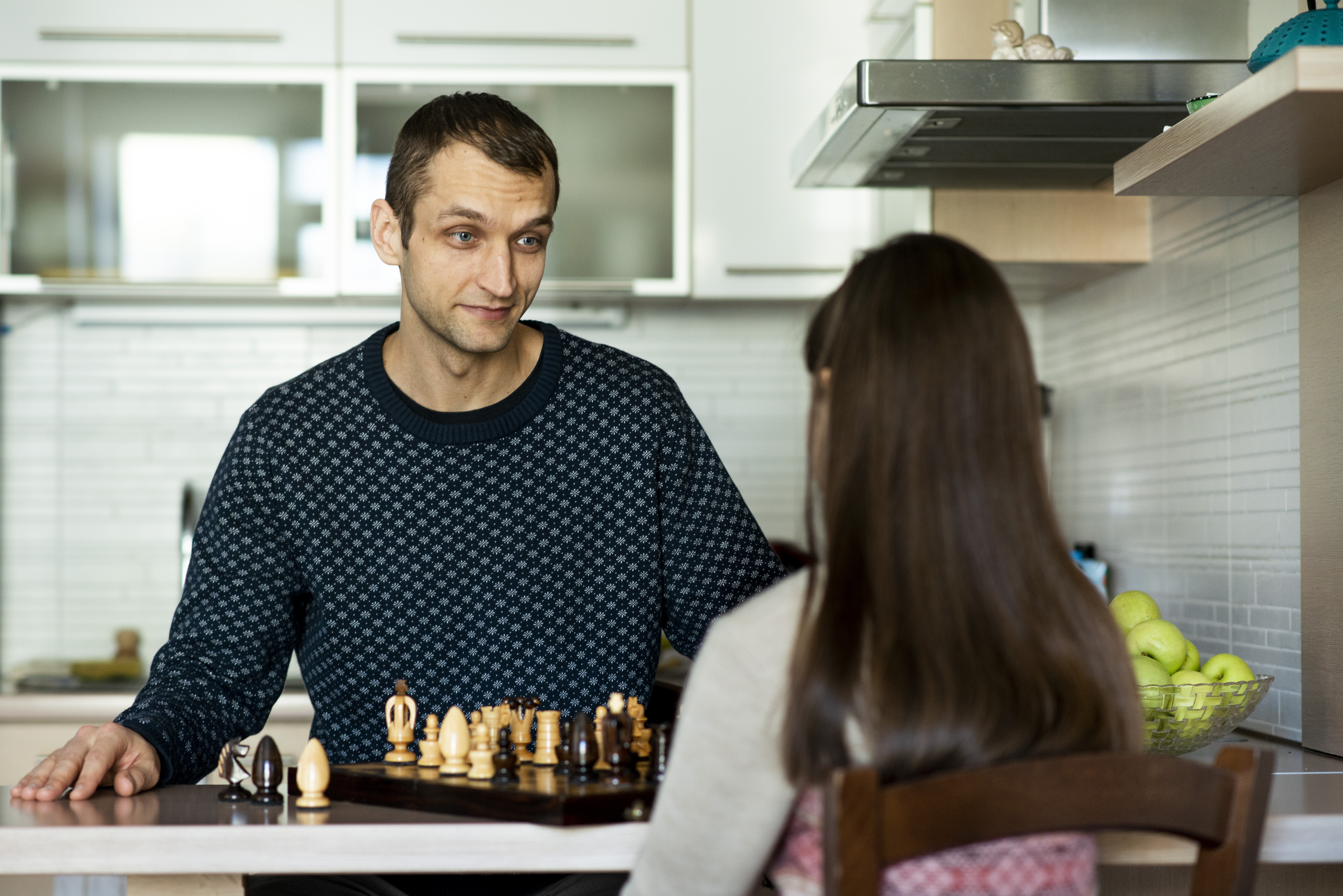 Ž. Juodeikis with daughter Aušrine. Photo: MF
Ž. Juodeikis with daughter Aušrine. Photo: MF
Which study period would you consider as the most challenging? Were there any moments when you regretted choosing medicine?
Eglė: I’ve never regretted choosing medicine or residency or doctoral studies. These were years full of determination, illusions and idealism. Full of joy, friendship and meaning. Full of scientific discoveries, conferences, internships, acquaintances, joint work and projects. I think every young person goes through these periods of elation.
Later comes the feeling and perception of reality that the world is not somewhere that the sun shines or flowers blossom all the time. I was disappointed when, already a physician, I came across the humiliation of my profession in the media, when I realized that any doctor could be dragged through the courts as the most cruel criminal, and when I realized that our tragedy lies in the constant speaking at cross purposes between the medical community and society. That this is a chronic problem, and no one doctor will be able to change it.
Žygimantas: Yes, but these aspects don’t seem to have finally “killed” us. We are still proud of the fact that we are doctors, and we don’t regret having become doctors.
During the years of your studies, you didn’t just have the burden of work obligations, studies and research on your shoulders, did you? At that time, you were also raising your children.
Eglė: I always thought that the knowledge gained from studying medicine would help me raise children. But the more you know, the more fears you have. When our daughter was attending kindergarten, we were fresh, young doctors. We had to work night shifts, but there were times when our daughter was ill and I left her crying and with a fever with Žygimantas or with my parents... and went on to “rescue” the world. I knew that my daughter would be well looked after, that I would see her soon after my night shift, but I still can’t forgive myself for this. When we had our son, we were probably mature both as doctors and as parents. We try to put family first, and only then – patients, work, and career.
Žygimantas: Psychologists have proved that if a person’s physical, biological and especially emotional needs are not met in childhood because their parents were always busy with work or had no time for their children, they will never be happy and will not be able to make others happy. They will keep looking for the unconditional love and attention that they did not receive in childhood in the hearts of others. But strangers cannot give us unconditional love.
Eglė: Žygimantas and I often say that we will try to spend our free time together, and give what is most precious – time, attention and love – to our children and each other. It is impossible to earn all the money in the world or treat all the patients in the world. But it is possible to bring up psychologically strong children and to feel the small, simple and sincere joys in everyday life.
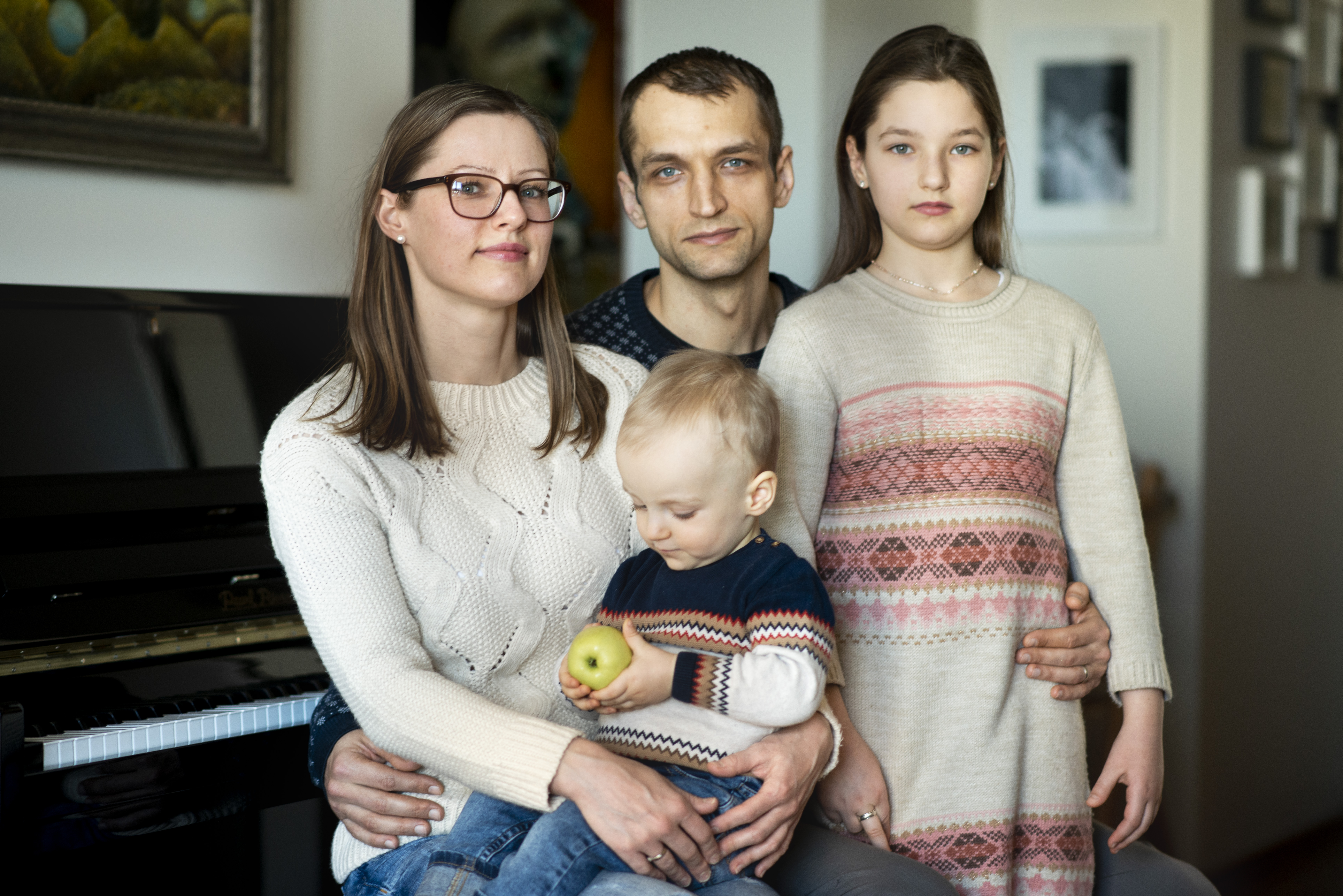 E. Sakalauskaitė-Juodeikienė and Ž. Juodeikis' family. Photo: MF
E. Sakalauskaitė-Juodeikienė and Ž. Juodeikis' family. Photo: MF
Before we met for the interview, you mentioned that almost half of your university friends left to live and work abroad after completing their studies. What determines such a decision by young doctors?
Žygimantas: I think that most frequently the decision to go abroad is determined by the relatively low wages and the limited possibilities to further one’s medical and professional ambitions in Lithuania. We graduated in 2010, the time of changes – we had a shorter internship, so we entered the residency together with interns who were one year older than us and whose internship was a full year. This means that medical students from two years – about 300 doctors – entered residency at the same time (the number of places was slightly increased but mainly at the expense of the residency for GPs).
It was not easy for a sixth-year student to compete with an intern who had more clinical experience, performed more research, etc. during a motivational conversation. More than half of the students in my year failed to get the residency places they wanted, so they left for Germany, Switzerland, Sweden, Norway, and the United Kingdom – to work, learn languages, and get a spot in their desired residency training programme.
Eglė: It’s a great pity that some of the most wonderful, joyful and talented friends left Lithuania. They may not have been the top of the class, but it is not only scores that determine the professionalism of a doctor. Practical skills, common sense, psychological maturity, emotional intelligence, ability to communicate with both patients and colleagues, vitality, and motivation are far more important.
On the other hand, it is gratifying to see that our friends are now established abroad, have families, are raising their children, and are heads of hospital departments or units. They also have the opportunity to perform complex surgeries and diagnostic tests, which, in Lithuania, are only performed by a few “lucky” ones, while we ordinary doctors, can only dream of doing so.
Have you thought of moving abroad? What made you decide to stay in Lithuania or to not even consider the possibility of emigration?
Žygimantas: Eglė and I discussed this when we graduated from our medical studies. We decided that values such as family, language, and social life are important enough reasons to stay in Lithuania.
Eglė: However, we have not finally rejected the idea of emigrating. At the moment, Žygimantas and I are in a stable situation: we have completed our doctoral studies, we both work at the Faculty of Medicine of Vilnius University, we specialize in our respective medical fields in hospitals, Žygimantas – in surgery for obesity, I – in sleep medicine. The psychological environment in our workplace is also favourable enough and promotes personal development.
We work hard, but at the moment we feel that we have sufficient time for the family, children and our hobbies. If the situation changes, gets worse – we don’t exclude the possibility of emigration. Despite the fact that we love our country and try to work for its people, we are absolutely free people, we want to be useful where we, as specialists, are required and where our work and efforts will be appreciated.
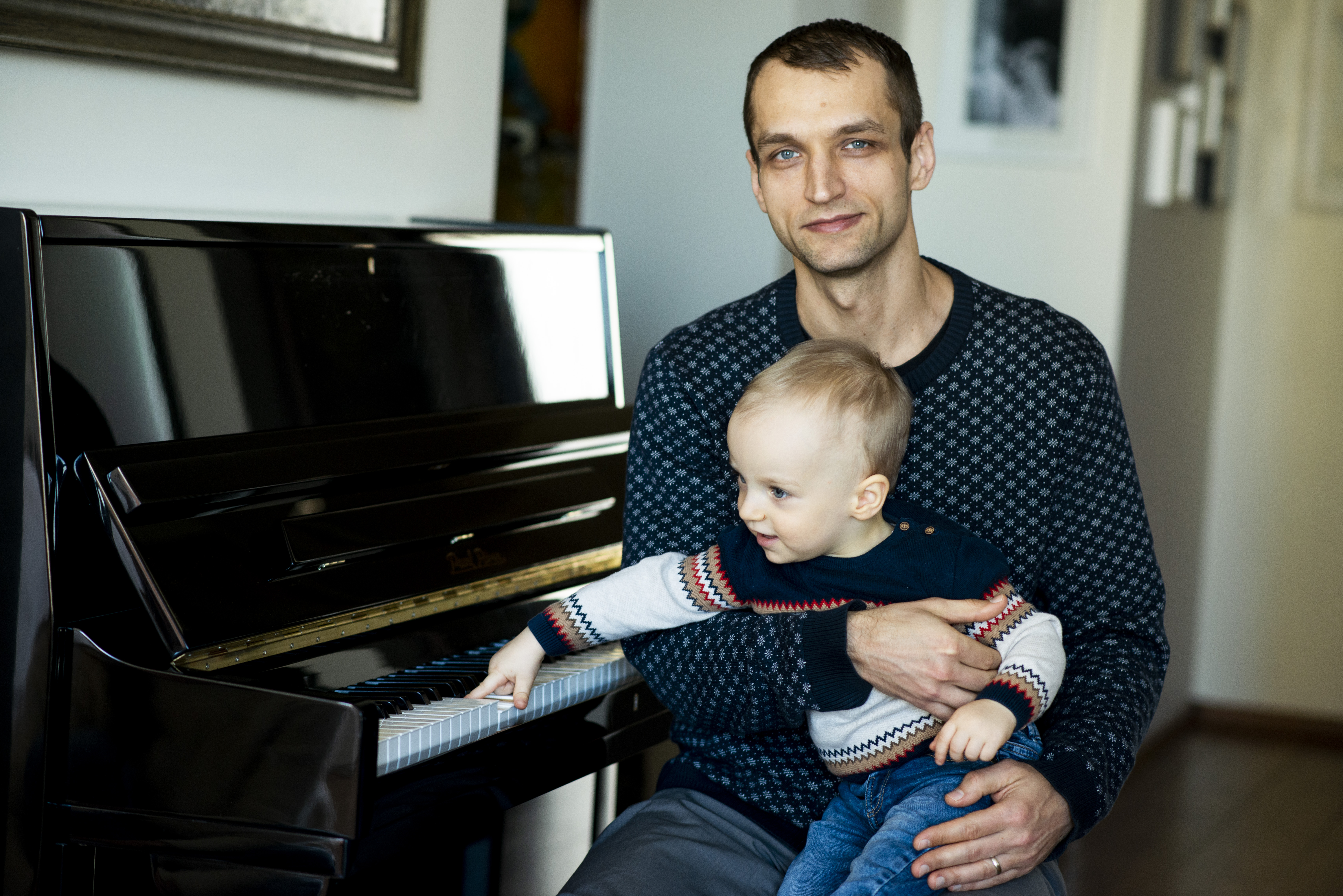 Ž. Juodeikis with son Radvilas. Photo: MF
Ž. Juodeikis with son Radvilas. Photo: MF
What do you think should specifically change, so that doctors who have completed their studies in Lithuania would be more interested in living and working in Lithuania?
Žygimantas: First of all, the manifestations of mobbing in medical institutions must disappear. Not so long ago, we lost a young colleague in our hospital, and one of the reasons was constant psychological stress and humiliation at work.
Secondly, doctors are probably the one group in society that has devoted the most time to studies and qualification training. For example, Eglė and I studied medicine for 6 years, our residency programme lasted 4-5 years, and our doctoral studies – for another 4 years. Thus, we have been studying for 15 years to become specialists. Yet, we often hear that doctors are called “bribe takers”, “murderers”, etc. Or the relatives of a patient often ask “which doctor services this ward?”
Any patient can leave negative reviews on a website, in which they not only give their opinion, but also threaten the doctor. For any complications that occur, the doctor is always blamed first in Lithuania, although not all complications are due to medical errors, most of them occur due to the weakened immune system of the patient, bad habits, unhealthy nutrition, passive lifestyle, overweight, accompanying diseases, etc.
I understand that we live in a free society where everyone can express their opinion. Perhaps the “misunderstanding” between doctors and patients is determined by the reasons mentioned by Eglė – the lack of time for the patient, inability to listen or explain in a comprehensive way about the patient’s condition. Both patients and doctors must start learning productive and positive communication.
Thirdly, wages should change. I know very few doctors living and working in Lithuania who work in one post. It is very common to have 1.5 or 2 posts to meet essential material needs. This workload, sooner or later, results in the “burn-out” of doctors – they become irritated, lack empathy and feel apathy. Hence, it is not only the doctor and relatives that suffer, patients also suffer.
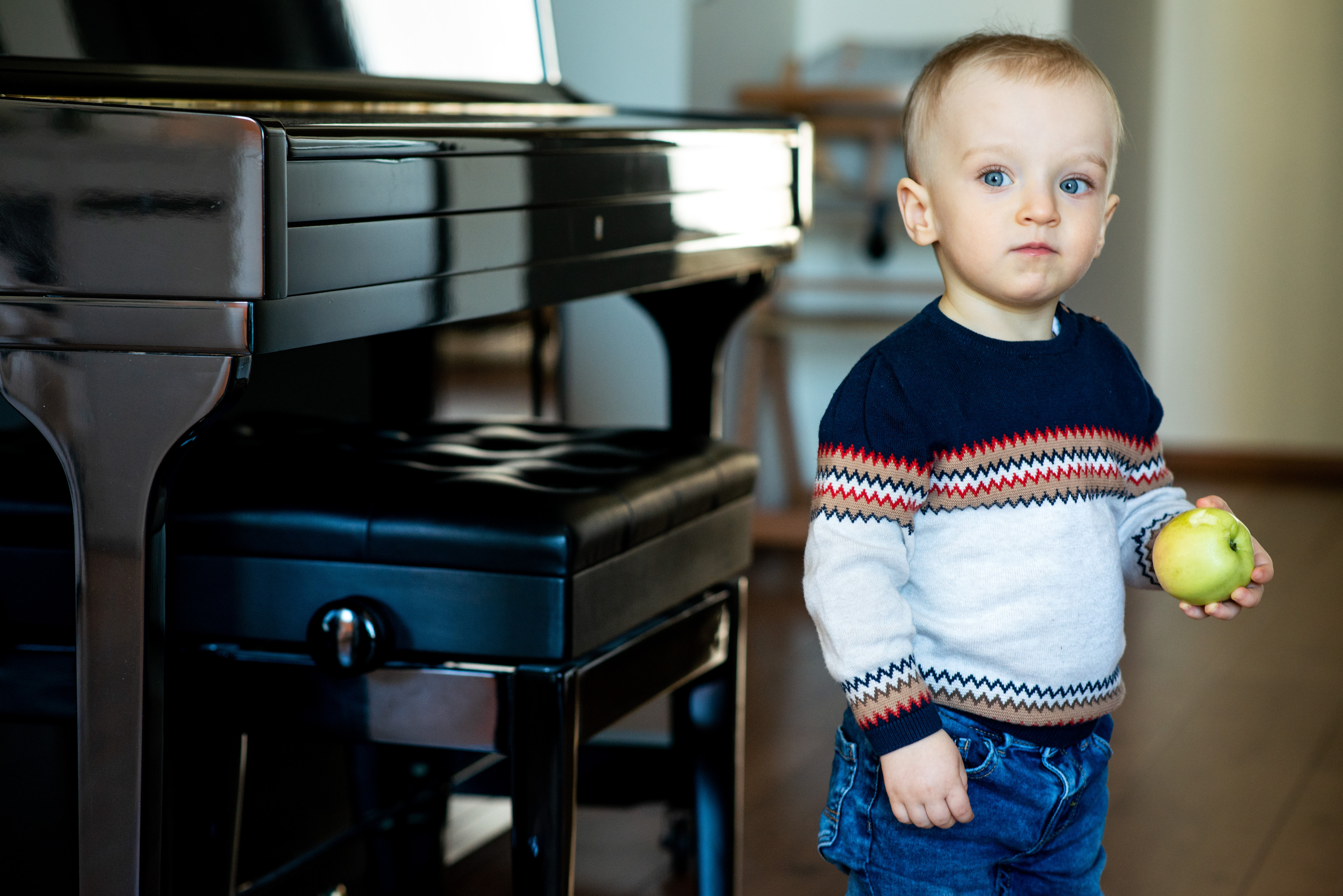 The youngest family member – 1 year old Radvilas. Photo: MF
The youngest family member – 1 year old Radvilas. Photo: MF
Eglė, you have recently shared a journalistic study on social media, which revealed the work of medical students and doctors behind the scenes. To what extent does such a toxic environment affect the further choice of young doctors to build their future in Lithuania or move abroad?
Eglė: Yes, the influence of such an environment on a young person is enormous. Some medical students are already studying German, Norwegian or Swedish languages in their first year of studies – for plan “B” if the situation in Lithuania doesn’t improve. How many great, gifted young doctors we will lose! Who is going to treat us when we get old?
Mobbing exists everywhere, not only in the healthcare system, but also in education and other areas. However, what has been happening for many years and is still going on in the healthcare system is horrifying. It’s hard to believe how we’ve come to this. I’ll give you an example, which is just the tip of the iceberg: the fact that some hospital managers have been managing the same hospital for 40 years (longer than Josef Stalin ruled the Soviet Union!), and neither legislative authorities nor municipalities can replace them shows that a dictatorship can successfully exist in a democratic country.
In this case, any talk about progress, innovation, transparency, zero tolerance for mobbing in healthcare, etc. by politicians is completely futile. These are just loud words that have disappeared in a desert. I think we will need a few hundred years and many changes before this culture of terror, humiliation and mobbing is driven out of the healthcare system. No one doctor or even several enthusiastic doctors will be able to achieve this, because they will be quickly crushed, psychologically destroyed and swallowed by this system.
I lived, studied and worked in what was really a very sheltered bubble during my study years and residency, compared to what was published in the study by B. Davidonytė and D. Pancerovas. At such moments, when faced with such an incomprehensible reality, the pain and injustice experienced by other doctors, I think to myself how grateful I am to the vast majority of VU MF lecturers, senior medical doctors, neurologists and psychiatrists for allowing me to be what I am and to become what I’ve wanted to become.
